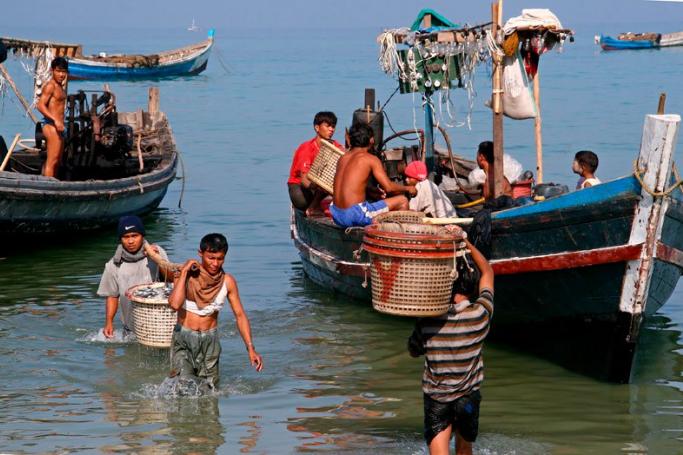Indonesia and Thailand agreed April 23 to set up a joint taskforce on illegal fishing, a lucrative cross-border trade that labour groups claim is responsible for enslaving thousands of workers from across Southeast Asia.
Thai companies have been linked to shadowy fishing operations in Indonesia, a bountiful hunting ground for a blackmarket industry that costs Jakarta an estimated $20 billion [K20,000 billion] in losses every year.
Fishermen from Cambodia, Laos, Myanmar and Thailand are among those said to have been forced to trawl.
The administration of Indonesian President Joko Widodo has embarked on a hardline campaign against illegal fishing since taking office in October, seizing and scuttling unlicensed vessels.
Some of these vessels have also been suspected of enslaving foreign fishermen, hundreds of whom were returned home earlier this month after being discovered by Indonesian authorities dumped on islands in the country's remote east.
Widodo and Thai army chief General Prayuth Chan-ocha - who took power in a military coup last year - agreed April 23 to cooperate more closely during a meeting on the sidelines of a conference in Jakarta.
Indonesian foreign ministry spokesman Arrmanatha Nasir said the meeting was "friendly" and both leaders acknowledged more needed to be done.
"Both leaders are going to set up a taskforce to address this issue," he said.
Prayuth acknowledged Thailand had its own problems with illegal fishing and was cracking down on the trade within its borders, Nasir added.
The use of slave labour in the fishing industry was highlighted recently after Indonesian company Pusaka Benjina Resources was accused of mistreating and abusing fishermen in eastern Indonesia.
Indonesian authorities later said there a "strong indication" Pusaka was acting as a shell company for Thai fishing operators.
The International Organization for Migration estimates up to 4,000 fishermen may be stranded in remote parts of Indonesia, mostly dumped by illicit fishing operators.
It believes the large majority of those working in the illegal fishing industry in Indonesia are victims of trafficking.
© AFP
You are viewing the old site.
Please update your bookmark to https://eng.mizzima.com.
Mizzima Weekly Magazine Issue...
14 December 2023
New UK Burma sanctions welcome...
13 December 2023
Spring Revolution Daily News f...
13 December 2023
Spring Revolution Daily News f...
12 December 2023
Spring Revolution Daily News f...
11 December 2023
Spring Revolution Daily News f...
08 December 2023
Spring Revolution Daily News f...
07 December 2023
Diaspora journalists increasin...
07 December 2023
Koh Tao murder case prisoners see no change in their status on Thai King’s birthday












